Rocket Arabic

Summary
Rocket Arabic has over 120 hours of audio and reading lessons that are aimed at helping beginners learn Egyptian Arabic. While the lessons offer up numerous opportunities for users to improve their reading, writing, speaking and comprehension skills, I think the content is severely lacking and is not very well thought out. Unsuitable for intermediate and advanced learners, beginners will definitely learn some Arabic, although I think they would have to use the resource alongside a couple of others to really make any headway.
While the platform looks great and is easy to use, the actual content of the lessons isn’t very good.
The lessons could cover a lot more grammar and use more Arabic, although the cultural explanations are quite good.
The content doesn’t warrant the price as you’d have to use other language learning resources alongside it.
I Like
- Lots of practice opportunities, though they rely too heavily on memorization.
- It’s a pretty well-designed and easy-to-use product.
I Don’t Like
- The audio lessons are uninspiring to listen to, don’t cover all that much content and are mainly in English.
- The extra features are all very similar, quite repetitive and are unlikely to get you speaking and writing Arabic to a very high level.
- It’s too expensive for what’s included.
Price
It’s a one-time purchase that costs $149.95. You can also use their six-month payment plan which costs $27/mo. There do seem to be regular sales which lower the price to under $100.
Having previously tried out Rocket Portuguese and come away feeling disappointed, I was very eager to see whether Rocket Arabic was any better. Unfortunately, I found many of the same issues facing the Arabic version and consequently can’t recommend Rocket Arabic to the beginners it is aimed at.
While the product is very well designed and feels very sleek, the content itself is not very well thought out and I find it highly unlikely that the lessons would actually get you speaking or writing Arabic to a very high level.
The audio lessons aren’t all that interesting to listen to and, although they are accompanied by various activities that could help you learn how to read, write, speak and comprehend Arabic, most of it is basically memorization in one form or another.
There are some positives, however. You’ll learn some very interesting things about Egyptian culture and the grammar of the language and, while it may not be the best resource, beginners almost certainly will improve and learn some Arabic.
Overview
There is currently only one level of Rocket Arabic available to learners, and it’s most suitable for beginners; intermediate and advanced students should look elsewhere. It is important to note that all of the lessons focus on Egyptian Arabic.
Level one consists of seven different modules, made up of three types of lessons: Interactive Audio Lessons, Language and Culture Lessons and Writing Lessons. There are also 10 survival kit lessons to help you out with some of the absolute basics and four audio review lessons.
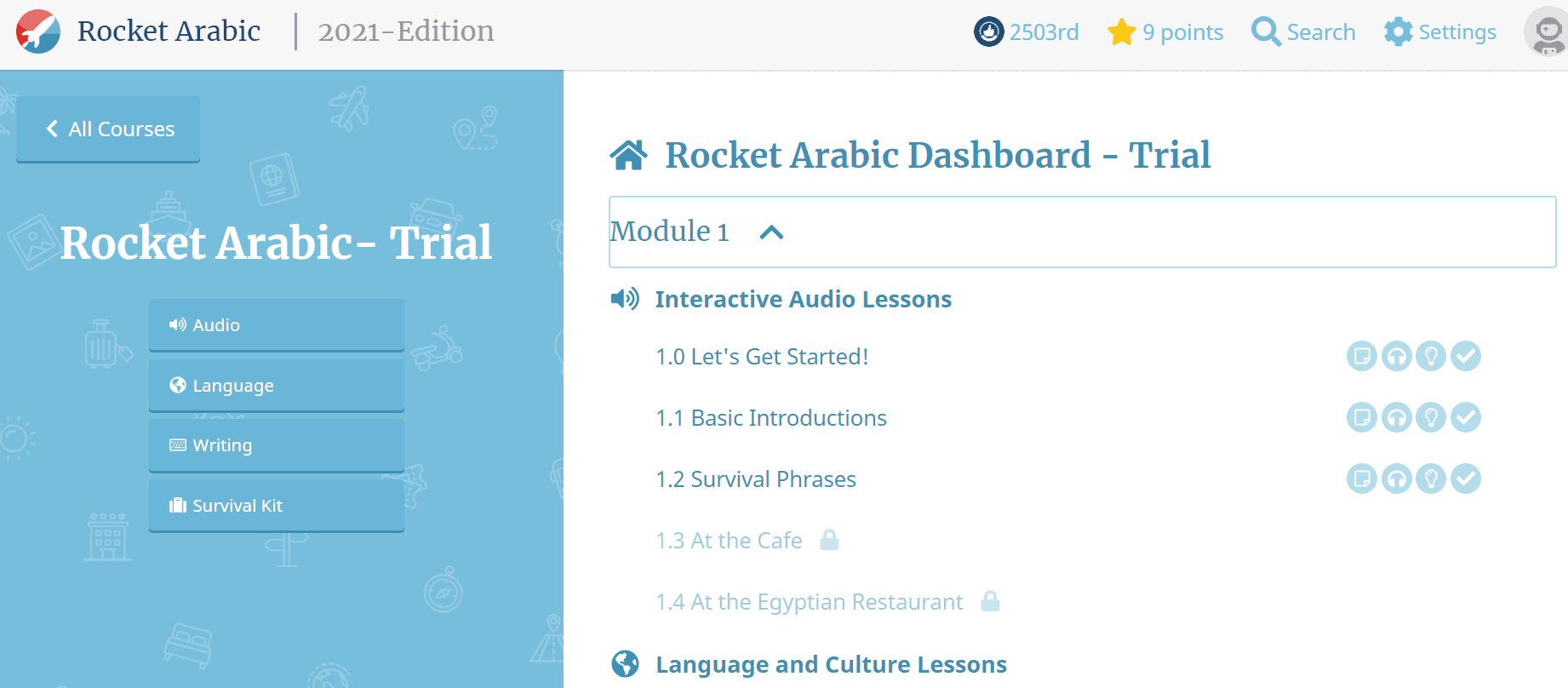
There are various components to each lesson that help the learner get more engagement with the material which we’ll take a closer look at these in the next section. They focus on your comprehension, speaking, writing, and grammar skills. There are short quizzes to test how well you have learned and retained the information.
In total there are over 120 hours of material for learners to go through and the expectation is that you’ll greatly improve your spoken Arabic, knowledge of grammar, vocabulary, and also come away being able to write some simple sentences and phrases.
You can go through your Rocket Arabic lessons on your phone or computer, and the content is available for download. You can test out the material yourself before purchasing it with their free trial.
Let’s now take an in-depth look at how to sign up and what the lessons actually involve.
Getting Started
Once you sign up for an account and confirm your email address, you’re ready to start learning Arabic. The free trial gives you access to a handful of lessons for six days.
The main dashboard is very clearly laid out and so it is easy to see where you should begin with your language lessons. There’s also an interactive tutorial that walks you through all the components of the course when you first log in.
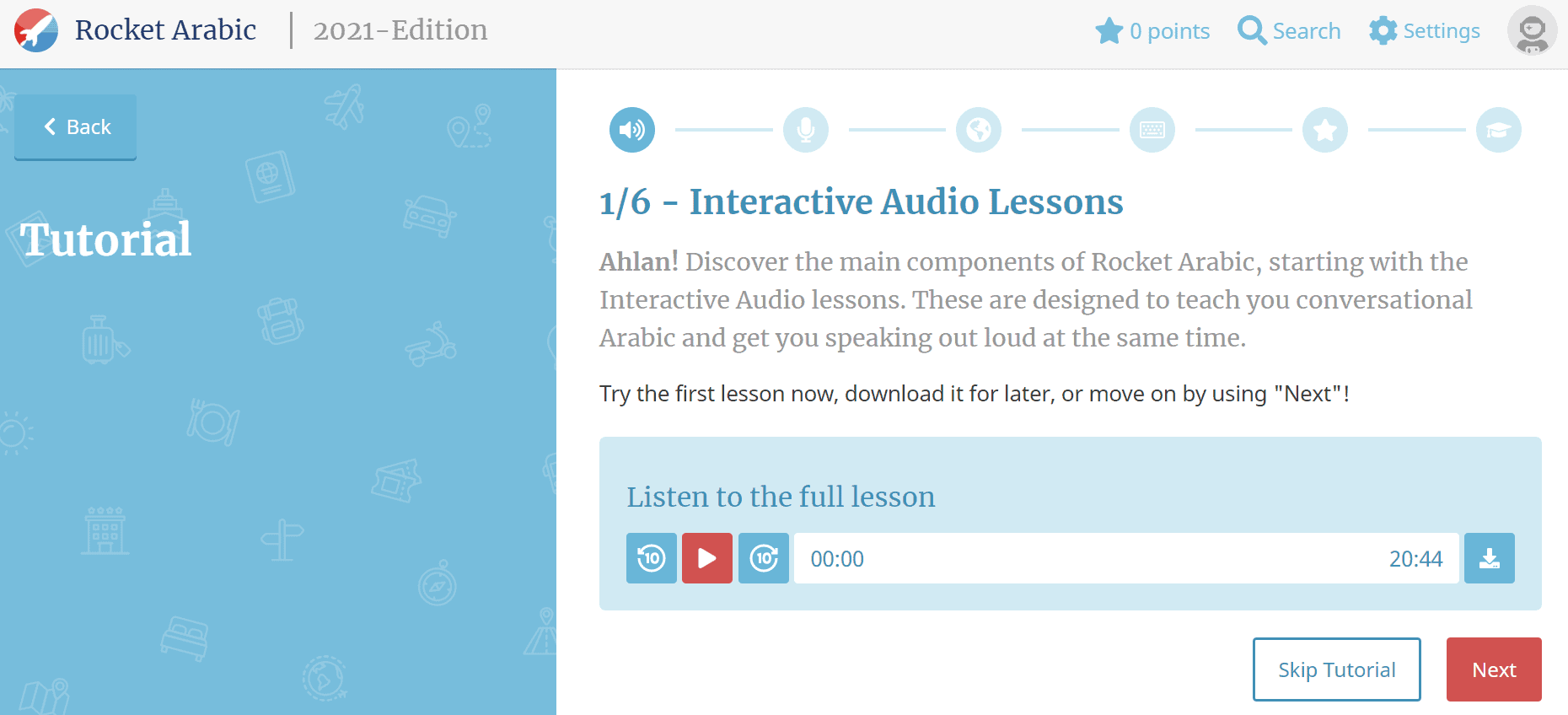
The production quality is very high as is the look and layout of each lesson.
The first lesson, which is around twenty minutes in length, starts off with some nice Arabic music after which you are greeted in Arabic and welcomed to the course by one of the hosts. You are then introduced to the native Arabic teachers who will help you with your language learning journey.
After a couple of cheesy jokes about camels and Egypt, the hosts tell you about how the course works and how you can make the most of the resources available to you on Rocket Arabic.
A few minutes later, your hosts teach you how to count to six. The numbers are said at a slow speed so you can easily follow. A short conversation in Arabic follows at a normal speed, after which each word and sentence is broken down into more manageable chunks and is translated. You can follow the conversation by downloading the transcript that accompanies the lesson or find the list of words and phrases used beneath the audio file.
The host also explains any grammar points that come up and, as you’ll hear both male and female native speakers, you’ll get to experience various accents and voices. In addition to this, you also learn a little about the culture of the Middle East as the host explains the context of the words and phrases you’re learning.
You also learn a little about how to pronounce the words you hear, and spaces are left in the audio so that you can practice them out loud. This first lesson looks at greetings and ends with a Rocket Review where the host asks you questions about the material you have just gone over and spaces are left for you to give your answer before one of the native speakers gives the correct answer.
You can practice the words and conversation afterward with the Play it! feature, where you can click on a word and hear it played out loud before recording yourself saying it and you get a rating on how well you pronounce it.
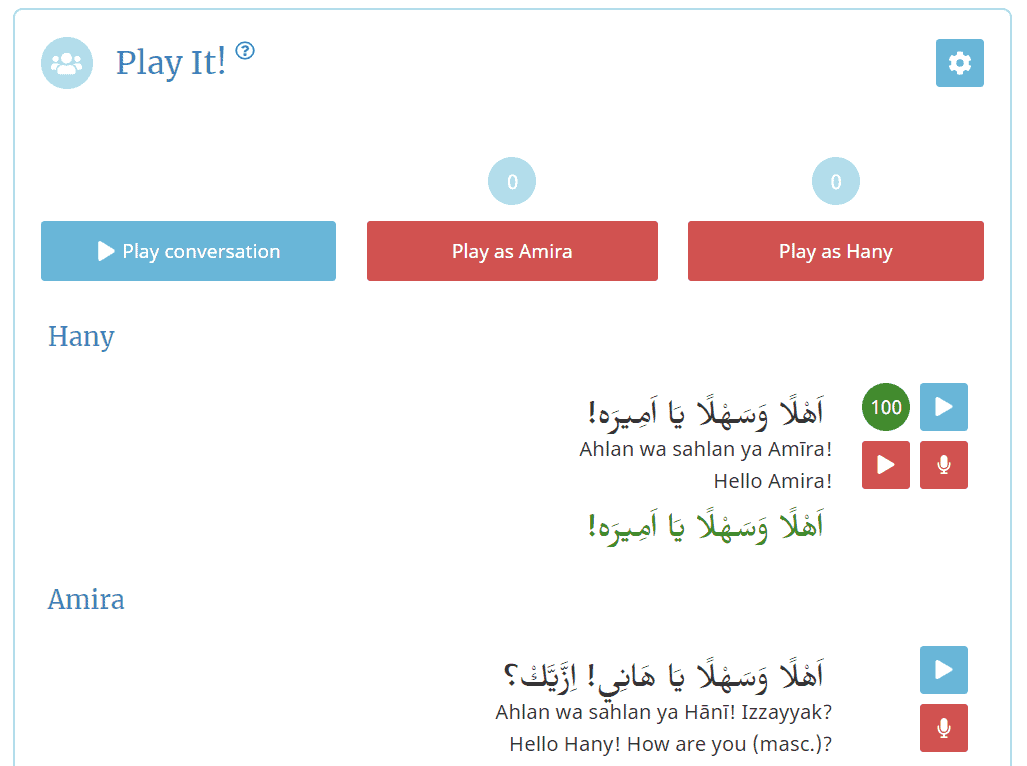
Then there’s an Extra Vocabulary section, in which you’ll have the chance to see relevant words and phrases in Arabic with English translations, audio, and the chance to record yourself speaking.
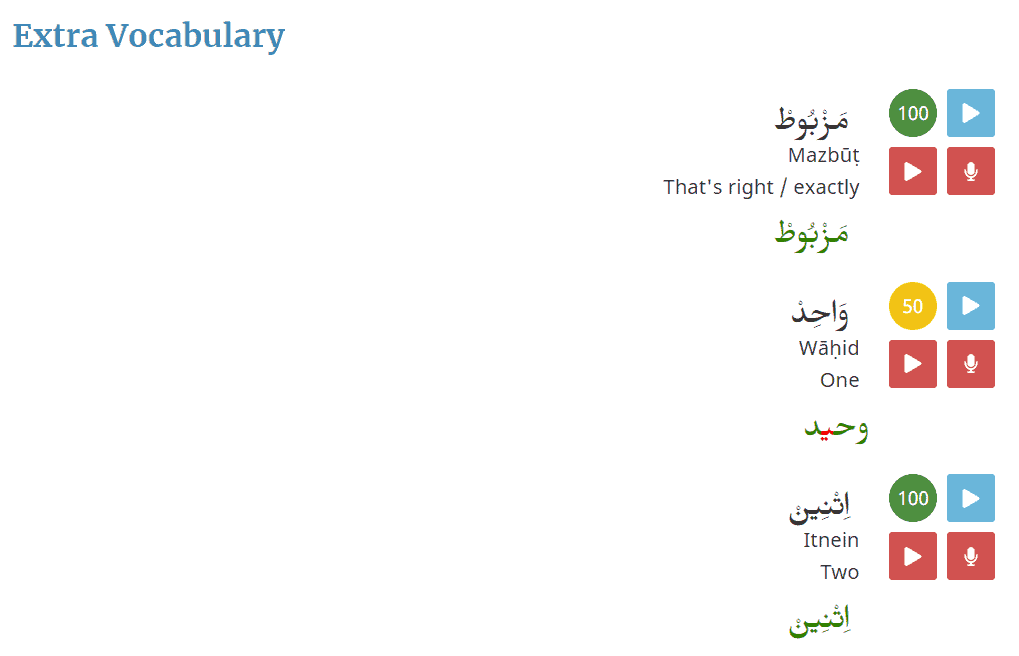
Rocket Reinforcement Activities
The activities in this section accompany each lesson in Rocket Arabic and provide lots of practice with the lesson material. The first is the flashcard activity.
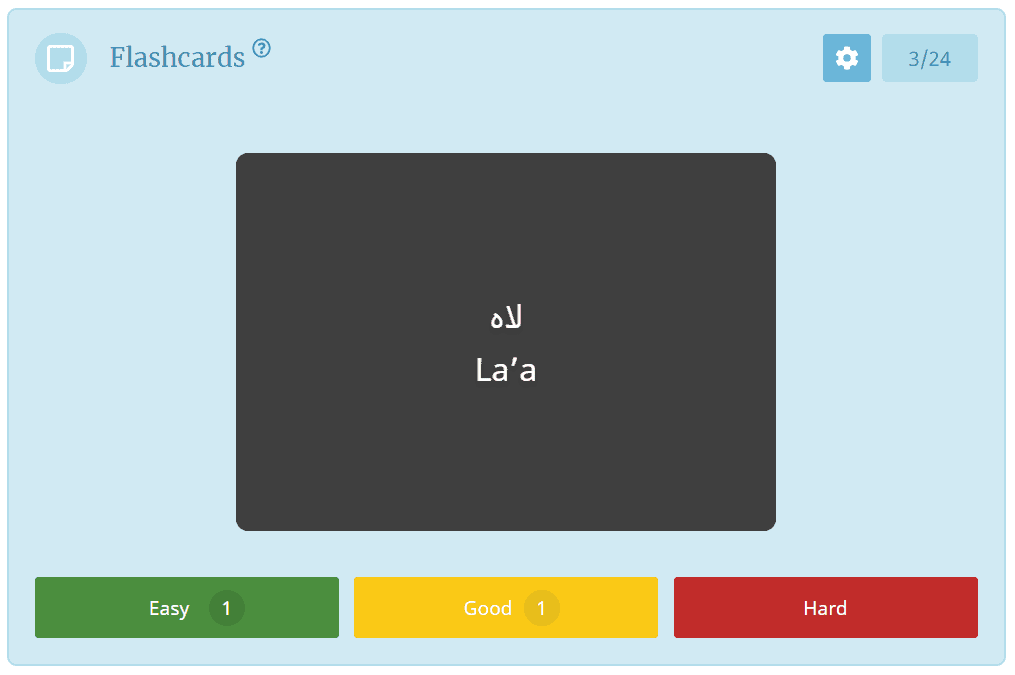
It’s a straightforward exercise: perform a translation of the given term in your head, reveal the answer, and score yourself based on how difficult it was.
The next activity is called Hear it! Say it! As the name indicates, you listen to a word and then try and repeat it as perfectly as possible and you are again given a rating on how well you do.
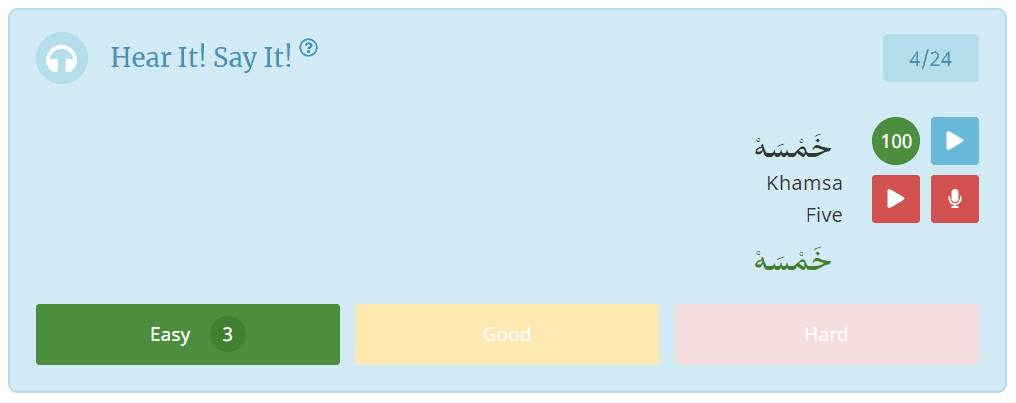
The next section is Know it! — here you see a word written in English and have to say it in Arabic. This tests how much you have retained from the class as well as your pronunciation of the words.
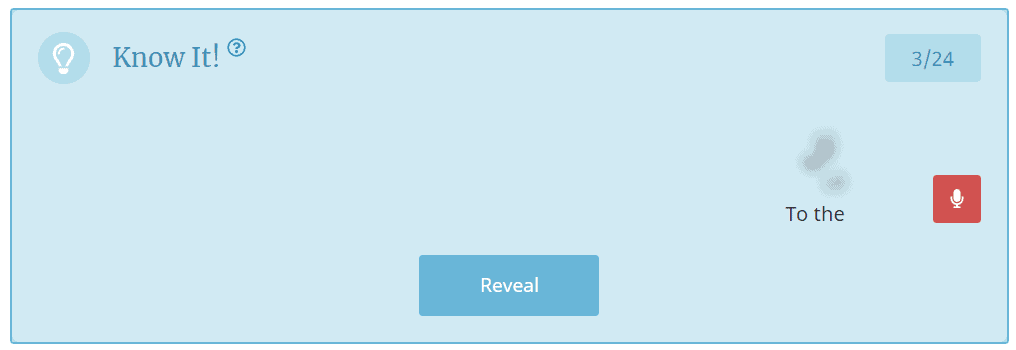
Following on from this is a short quiz where you answer multiple-choice questions about the material you covered in the lesson.
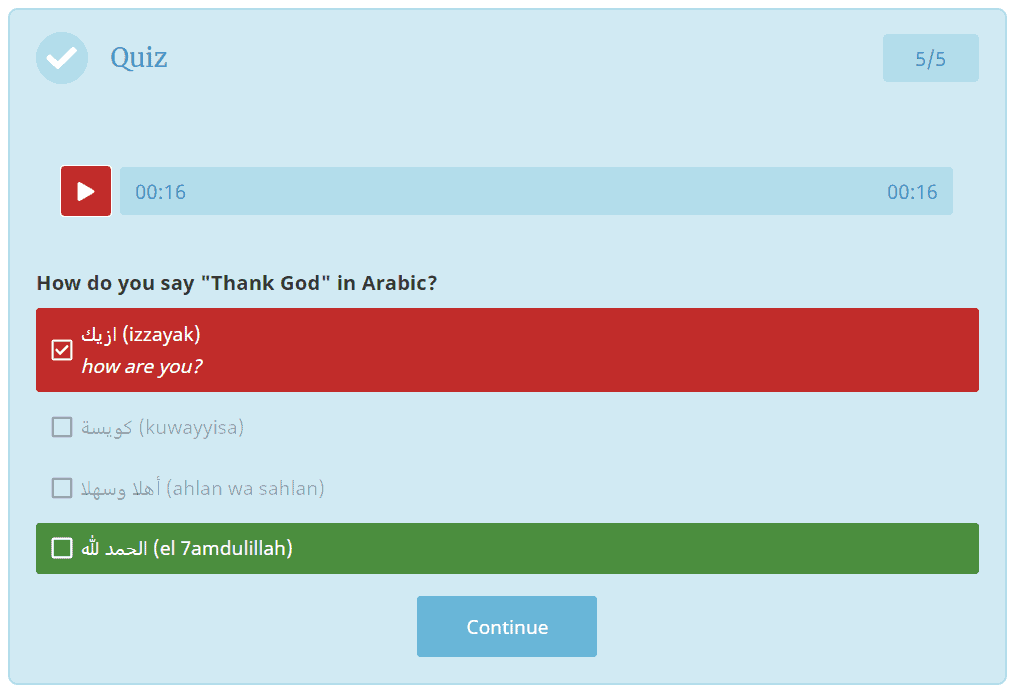
You’ll receive a translation of your answer if you choose incorrectly, but you might run into some confusing romanizations that include numerals like the one in the above image — more on this later.
Finally, some of the audio lessons finish with a section title, Extra Testing. This is where you’ll find the Sort it! activity, which provides some reading practice.
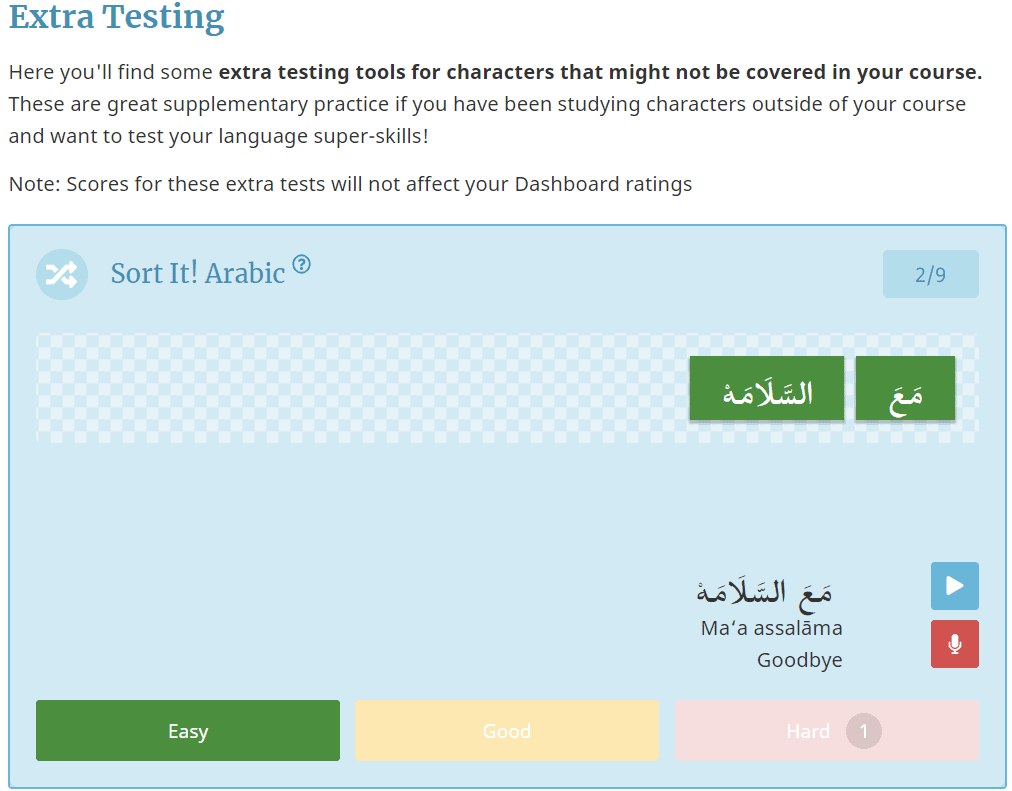
It’s a basic matching exercise that asks you to put words in the correct order. It seems to be at least minimally useful in providing some super basic character recognition practice, but you’ll probably need to use additional resources to get sufficient reading practice.
As you can see, each lesson has quite a few ways in which you can engage with the material, though they’re all pretty similar and may feel repetitive.
Audio lessons
As you continue to explore all that Rocket Arabic has to offer, you’ll notice that the production level is very high, that everything is very nicely laid out, and that there is a wealth of (very similar) ways in which you can engage with the course material.
While it seems like a really good package, after using it for a bit I’d actually argue that Rocket Arabic is severely lacking in a number of different ways.
The interactive audio lessons, for example, are very nicely recorded, sound very professional and do offer up some interesting cultural insights.
Despite this, I found the presentation to be a bit flat and uninspiring, and there is little chemistry between the host and native speakers. This doesn’t make it that fun or engaging to listen to.
While it is great that you get to hear different accents and voices, the vast majority of the lessons are spent in English. Although the native speakers do break down the conversation into more digestible chunks, it would be good if the platform allowed you to moderate the speed yourself or had line-by-line technology where you can follow the dialogue.
Another positive about these lessons is that over the eight modules the presenters cover a lot of different topics with many of them specifically related to Egypt itself, and there are lessons on such subjects as Naquib Mahfouz, the Egyptian Museum and smoking shisha.
While it is admirable that Rocket Arabic tries to teach you speaking, writing, reading, comprehension, grammar, and vocabulary through its lessons, maybe it would be better if it focused on teaching just a couple of these skills really well.
The interactive audio lesson part of Rocket Arabic essentially amounts to memorization; you aren’t given any way to actually use the words or phrases you’re learning in any other situation, and the vocabulary you are given doesn’t have any other examples for you to see how else you could use it.
The language and culture lessons are slightly different, as they don’t include an audio component. Instead, there’s lots of interesting and informative text for you to read about the cultural context in which some of the words are used and the grammar rules behind what you’re learning.
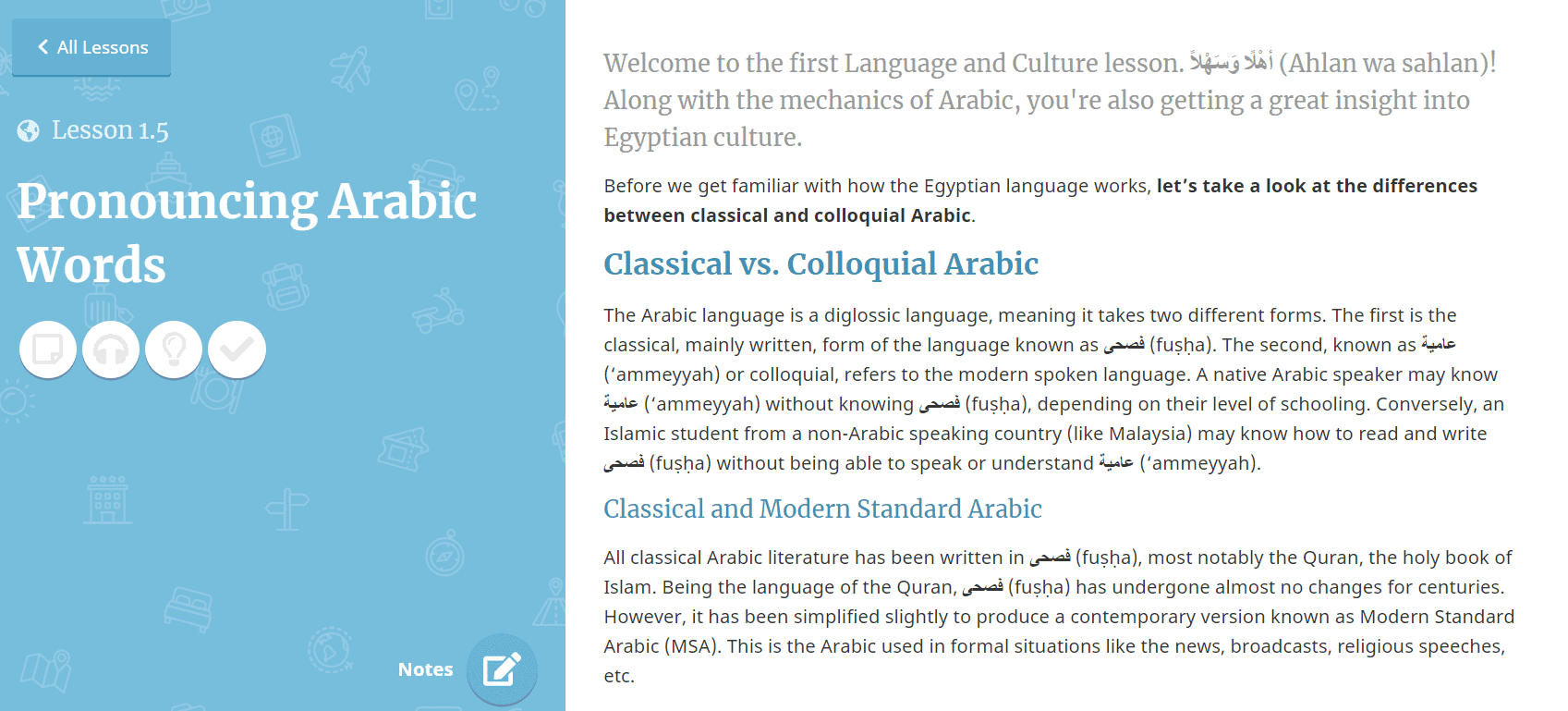
For instance, the Pronouncing Arabic Words lesson looks at the differences between classical and colloquial Arabic and why the Egyptian dialect is so popular and indeed important in the Arab world. Although written in English, the text is peppered with Arabic words that you can listen to in order to practice your pronunciation.
While it is all useful vocabulary, you’ll be exposed to both the standard Arabic and Egyptian Arabic version of words. At this early stage, I think many people would find that confusing and unnecessary. Again, there are no example sentences given for the words you are learning.
These lessons also have the Rocket Reinforcement Activities. In general, they were quite interesting but sometimes ended up being a wall of text with numerous Arabic words interspersed amongst the English explanation; the presentation can be confusing.
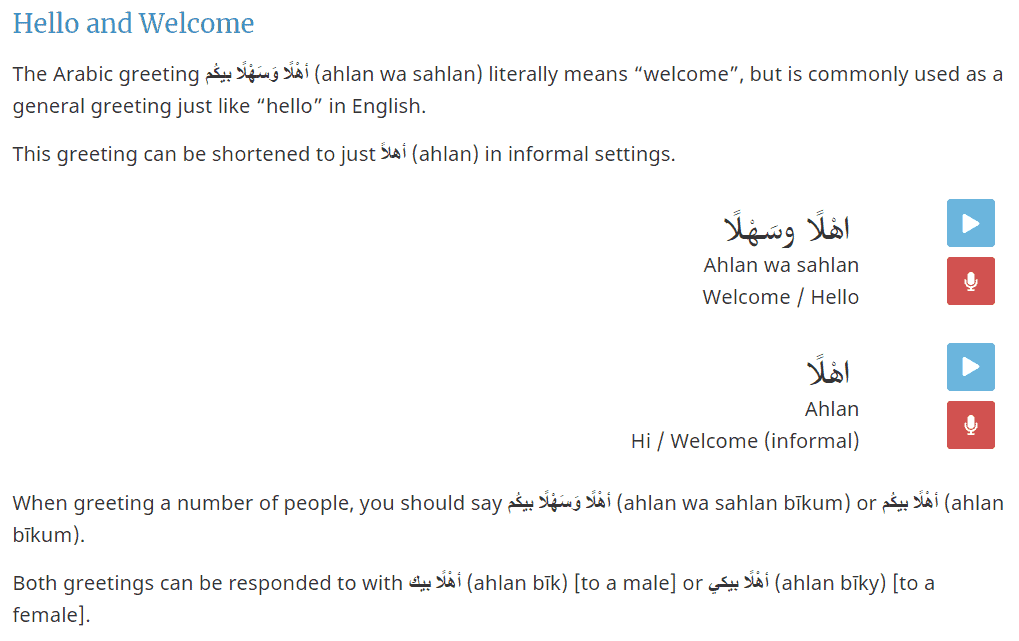
Learning to Write with Rocket Arabic
The seven modules in the Writing Lessons section contain 29 lessons and these interestingly start off by teaching you how to write numbers rather than teaching you the alphabet. This sort of makes sense as in Arabic numbers are written from left to right like in English while normal words and phrases are written from right to left.
To practice writing, you need to do it the old-fashioned way and grab a pen and paper and sit down to copy the numbers that they teach you. The is again no audio on offer apart from how to say the number in Arabic and there is a short video for each number where you can see how it is written. In comparison with the otherwise high production value, these two or three-second long videos are very basic.
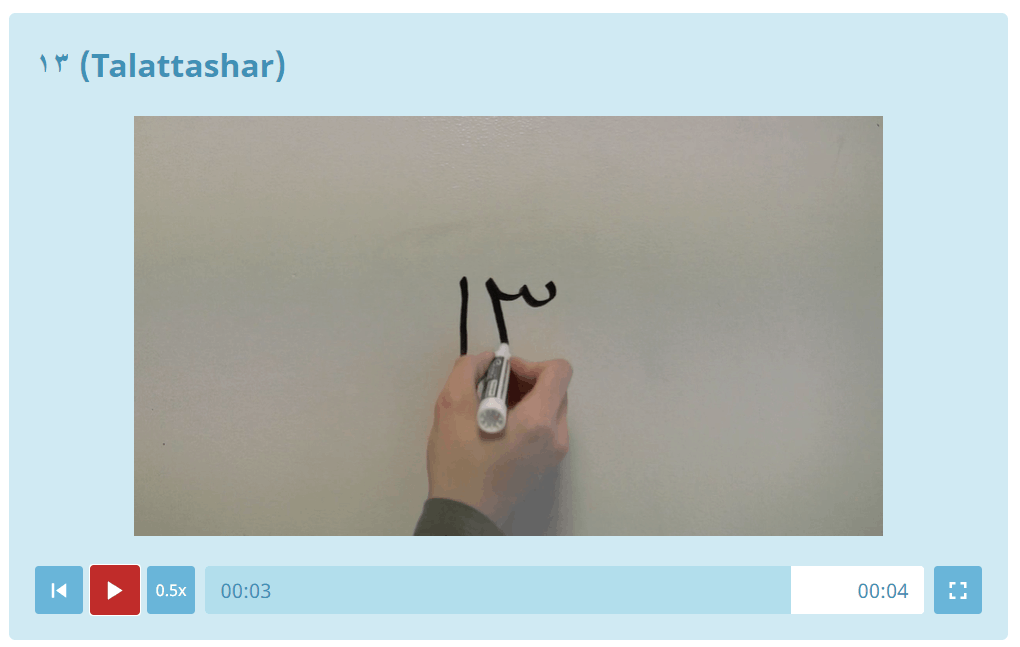
Rocket Romanization
One thing you’ll notice is that Rocket Languages sometimes appears to use the Arabic chat alphabet for its romanizations. This is a highly informal way of romanizing Arabic, and it contradicts what Rocket Arabic claims to do in its first language lesson.
See the example of the Arabic chat alphabet in the image on the right, and how Rocket Arabic claims to romanize the sounds on the left.
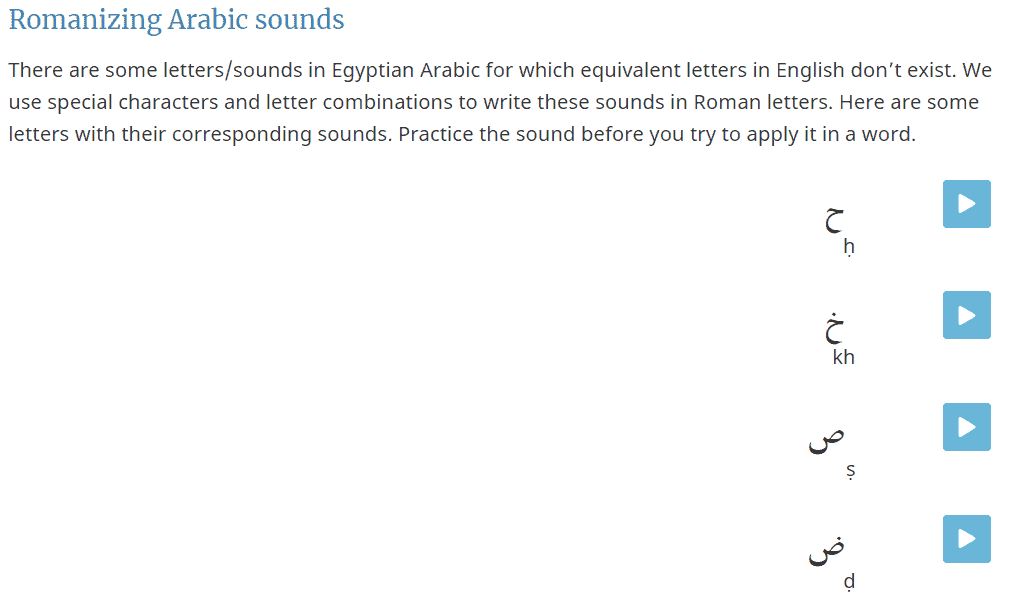
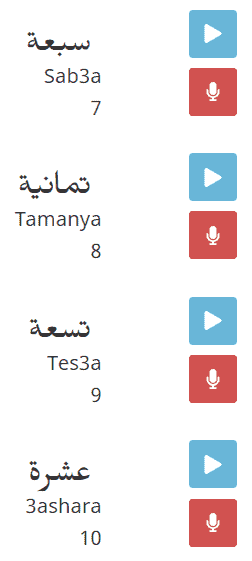
I came across this discrepancy in the writing lessons and in the Rocket Reinforcement quiz. Overall, it feels sloppy and makes me question the amount of effort that was put into creating this course.
Tools
In addition to the main lessons, there are various extra tools available that should help you keep track of your progress, stay motivated, and customize your learning experience.

The Progress tool may appeal to learners that like some gamification in their learning, the Benchmark tool is a nifty option for monitoring your improvement, and the Saved Notes/Vocab tools are slightly useful for those that want to keep track of what they’re learning.

It’s a shame that the Custom Flashcards feature isn’t available yet, as having the ability to study vocabulary from multiple lessons that you have trouble with would definitely add value to the course.
All of these small features give the appearance that Rocket Arabic is a well thought out product, but that doesn’t change the fact that I thought the resource’s content was lacking.
While I really like Rocket Arabic’s presentation and how easy it is to use, I, unfortunately, don’t think that the content itself is worth the price that is quoted. Although beginners will certainly learn a bit of Arabic, I feel that there is almost no way that they would be able to achieve their goal of speaking and writing Arabic by only using Rocket Arabic.
This is because most of the material amounts to memorizing words and phrases and the vast majority of the added features that accompany each interactive audio lesson seem to be quite similar and not very well thought out at all. As such, I think students would have to use Rocket Arabic in conjunction with a couple of other resources to stand any chance of learning decent Arabic.
Plans and Prices
For Rocket Arabic level one, users have two payment options available to them and, other than the time frame in which you pay and the price itself, each includes exactly the same features.

It would cost $149.95 if you choose to pay for everything up front. Alternatively, you could use a six-month payment plan which costs $27/mo. There does seem to always be some kind of sale going on, lowering the price to under $100.
Alternatives
Rocket Arabic is far from the only resource out there for learning Arabic. We’ve tried out a bunch of different resources and have come up with a list of our favorite online courses, apps, and podcasts for learning the language.
Here are some of our favorite options:
Pimsleur
This course is well-known for providing high-quality audio lessons that get learners speaking right from the beginning. The course places a major emphasis on aural and verbal skills, meaning you won’t spend much time at all learning grammar or how to read and write. Learners that want to get immediate practice producing Arabic will appreciate the high level of interaction these lessons require. Read our review of Pimsleur here.
ArabicPod101
This course has a similar feel to Rocket Arabic, but it’s also got some key differences. Where Rocket Arabic’s lessons can be quite boring, the content on ArabicPod101 is significantly more entertaining. There’s also a lot more of it; there are a ton of lessons on ArabicPod101.
An additional bonus is that the basic plan is very affordable, though the higher-priced plans might not be worth it. You also won’t get the same kind of hyper-focused course that Rocket Arabic offers, which may matter to some more than others. Here’s our ArabicPod101 review.
Language Transfer
Learners on a budget, check this one out! It’s totally free, but it’s important to note that it will only work for English speakers. The course takes a unique approach to teaching: there’s no note-taking, no intentional memorization, even. Instead, you’ll listen in on a lesson with another Arabic learner and learn how to think your way through speaking Arabic. Did I mention this one’s completely free? Full review of Language Transfer.
Final Thoughts
While it may look like a great product, Rocket Arabic, unfortunately, comes up short in a number of ways in my opinion. Although beginners will learn some Arabic, I doubt that it would take them up to an intermediate level.
This is because the lessons are primarily in English, and the content itself is quite repetitive and relies heavily on memorization, despite the numerous ways in which learners can engage with the material.
Although you do get some interesting insights into the cultural context in which Arabic is spoken and the grammar of the language itself, you often learn words and phrases in isolation and don’t learn how to use them in other situations and settings. While it is great that native speakers with different accents are used, this is not enough to offset the ways in which Rocket Arabic falls short.
Despite all of my issues with Rocket Arabic, it could still be worth giving their free trial a shot and seeing if you like it yourself. This is more because there aren’t as many good resources for learning Arabic as compared to other languages than a testament to their course. I personally preferred ArabicPod101and thought it was better in just about every area.
For the high price of Rocket Arabic, I don’t think you get much value for the money, and I would recommend looking elsewhere.

